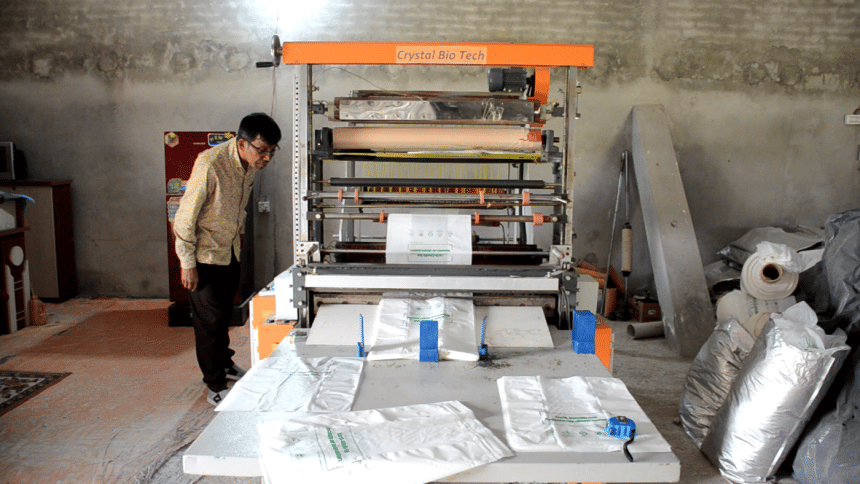Commercial production of compostable bags held up by regulatory hurdles

Md Iftekharul Haq, an entrepreneur in Rajshahi, had become a local pioneer in producing compostable shopping bags back in 2022, providing a much-needed solution for the rampant environmental pollution in Bangladesh caused by polythene waste.
Some environmentally conscious individuals and businesses in the region had even started using the bags made of bioplastic derived from corn starch granules, but Haq was unable to go for commercial production amid regulatory hurdles.
Mahmuda Parvin, deputy director of the DoE office in Rajshahi, said they categorised compostable bags as a green product in March 2023, paving the way for widespread production and distribution.
"But nowhere is there any explanation on how to determine biodegradability," she added.
As such, Haq has been waiting for over a year for his bags to be certified as a green product, which would allow him to market the item as an environmentally safe alternative to polyethene.
"Here I am trying to address the country's polythene pollution but my initiative is at risk of collapse while environmental degradation continues unabated," he said.
Following repeated appeals, the DoE agreed to grant green certification for Haque's bags pending approval from the Bangladesh University of Engineering and Technology (BUET) in August last year.
However, this caused further delays considering the lengthy testing procedures.
Despite the bureaucratic setbacks, Haq is still determined to pursue this venture as he estimates the global market for compostable bioplastic bags is currently worth about Tk 5,000 billion.
"And I alone am unable to fulfil this vast demand," he said, citing how existing polyethene product makers could be a part of the solution.
"This is because they too can produce compostable bags by implementing minor modifications to their factories," Haq added.
As per a report by the Environment and Social Development Organisation, the use of polythene bags has been banned in the country since 2002.
Yet, more than 2,183 crore polythene bags were used nationwide between April 2020 and March 2021, generating about 78,433 tons of waste that ended up clogging various drains and waterbodies.
Haq's journey to solve this problem began during his time as a trader of jute products before the Covid-19 pandemic.
"I had noticed at the time that despite being environmentally friendly, jute products were struggling to compete with their polyethene counterparts for being comparatively costlier," he said.
If was then in 2021 that Haq used the internet to discover how a number of Indian entrepreneurs had adopted a method of producing compostable shopping bags using German technology.
After doing more research and visiting a few of the Indian factories, Haq invested about Tk 2 crore to establish a factory called Crystal Bio Tech in Godagari upazila of Rajshahi the following year.
Based seven kilometres away from Rajshahi city, the factory is located on two bighas of land along the Rajshahi-Chapainawabganj highway.
After importing the required corn starch granules, Haq pours the material into a hopper that melts it in controlled temperature before being extruded through a blow film machine.
The film is then turned into sheets that later take on various shapes depending on the desired design.
Haq informed that there are two quick methods to determine the biodegradability of the bags.
The first is to compare how the compostable bags react to fire compared to polyethene alternatives as the former burns to ashes while the latter drip an oily residue.
The second test requires the use of dichloromethane, an organic compound that dissolves bioplastic but does not affect polyethene.
Haq also pointed out that he himself tested how it takes six months for his compostable bags to dissolve in water while polyethene bags can last indefinitely.
Some local businesses have used Haq's bags on an experimental basis while samples sent to potential buyers in India, the UAE, Canada and US were all okayed by their respective regulatory authorities.
Recently, some buyers from Sweden even approached Haq to buy some samples.
Regarding Haq's application for green certification in November 2022, the DoE's Parvin said they had initially rejected the appeal as it was a new concept at the time.
"So, we later sent his application to our headquarters, which instructed him to submit a biodegradability certificate from BUET," she added.
Meanwhile, the applied chemistry department of Dhaka University has already certified Haq's product as biodegradable while a sample was also sent to the Bangladesh Council of Scientific and Industrial Research (BCSIR) for the same approval.
Md Ahasanur Rabbi, a senior science officer of the BCSIR in Rajshahi, said samples of his bags were sent to Dhaka for the test, which is likely be completed soon.
"The biodegradability test is a lengthy procedure and it is essential to prevent scams," he added.
This means little to Haq though as he claims the delay is causing financial losses.
"I am already counting bank interest on loans and maintenance costs for running the factory without production," he said.
Besides, Haq pointed out another obstacle, namely the import duty on corn starch granules.
Due to the lack of a dedicated HS code for biodegradable products, these granules are imported under codes designated for other products with higher duty.
"This increases the production cost by 1.5 percent," he added.

 For all latest news, follow The Daily Star's Google News channel.
For all latest news, follow The Daily Star's Google News channel. 



Comments